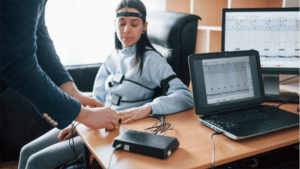GPN Newsroom (Articles)

Understanding Examiner Decision Thresholds: When Data Is Sufficient – and When It Is Not
Polygraph evaluation is a rigorous process that requires a detailed, methodological approach. To make accurate inferences, examiners must carefully analyze the physiological data collected by the lie detector machine.

How Examiners Evaluate Data Sufficiency Before Reaching Polygraph Conclusion?
Polygraph examination is a rigorous process that often culminates in careful data analysis.
Before inferring deception, examiners must determine whether the information collected is sufficient to enable accurate interpretation of the lie detector test findings.

How Polygraph Examiners Determine Appropriate Test Format For Each Case?
When it comes to polygraph exams, there’s no one-size-fits-all strategy. Each lie detector test requires a unique approach. To conduct a credible polygraph evaluation, examiners must follow certain industry-stipulated guidelines. The question design rules typically apply across the board.

How Polygraph Data Is Stored, Secured, And Used: Privacy Standards Every Client Should Know
Many clients have been there!
You enlist the services of a certified polygraph examiner. The polygrapher goes ahead to conduct a rigorous lie detector test, taking extreme caution to comply with the industry standards.

When Polygraph Tests Prevent Wrongful Accusations: Real-World Scenarios And Lessons
There is hardly a worse feeling than to have to contend with the accusation of an action you did not commit. Whether the accusation is made at the workplace, in a family, or in a court of law, the harm may have been done way before the truth is known.

Mechanics of Pneumographs: How Breathing Patterns Influence Polygraph Data
Pneumographs are an essential polygraph accessory, working alongside other attachments to collect vital physiological data during lie detector tests. Understanding their mechanics is critical in conducting a credible polygraph exam.

Why Polygraph Examinations Require Case-Specific Test Formats Instead Of One-Size-Fits-All Methods
The polygraph has gradually grown into a widely used investigative tool, assisting examiners in assessing credibility and supporting investigative processes.

How Examiners Determine Whether a Case Is Suitable For Polygraph Testing
Polygraphs have been used for decades to support investigative processes. While not 100% fool-proof, mounting research and professional standards issued by bodies such as the American Polygraph Association (APA)

What Makes Polygraph Question Fair? Analyzing Structure, Neutrality, and Bias
Learn what makes polygraph questions fair, neutral, and unbiased. Understand APA standards, question structure, examiner tone, and data interpretation.

